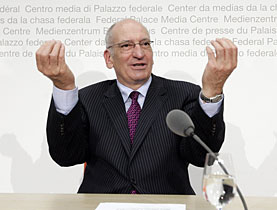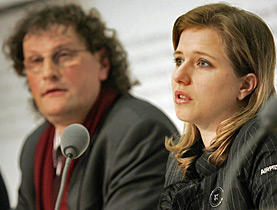Serbia recalls envoy as Bern recognises Kosovo

The Swiss government has joined the United States, Britain, Germany and other countries in deciding to recognise Kosovo as an independent country.
Serbia immediately reacted to the move by recalling its ambassador to Bern, arguing that it was an “attack” against Serbia’s sovereignty.
President Pascal Couchepin said Switzerland would establish diplomatic relations with the breakaway Serbian province, which declared independence ten days ago.
Couchepin said the government took the decision on Wednesday following consultations with two key parliamentary committees.
He said the government welcomed a commitment by the authorities in Kosovo to protect ethnic minorities and accept the presence of international civilian and military forces in the region.
“There is no ideal solution when emotions run very high,” said Couchepin in an indirect reference to angry calls by Serbians over Kosovo’s independence.
He added Switzerland had always taken into account the interests of all parties involved.
“Switzerland’s recognition goes hand in hand with the desire to develop further its good relations with Serbia and strengthen the very close cooperation,” Couchepin said.
Swiss Foreign Minister Micheline Calmy-Rey has openly backed independence for Kosovo for more than two years.
Reaction
Shortly after the announcement of the cabinet decision, Belgrade recalled its ambassador to Bern, Dragan Marsicanin, saying that this was a “first measure”.
“Others will follow. The government of Serbia still has to decide on this issue,” commented a counsellor, Bozidar Jovanovic, at the Serbian embassy in Bern.
He noted that Belgrade had recalled its envoys from those countries that had recognised the independence of Kosovo.
In a statement, the embassy said the “unliateral recognition” of Kosovo’s independence was “an attack” against the sovereignty and integrity of Serbia.
It added that the consequences could be far-reaching for the stability of the region and for Europe.
In Kosovo’s capital, Pristina, the spokeswoman of Prime Minister Hashim Thaçi said Kosovo would always be grateful to Switzerland not only for the recognition of independence, but also for Swiss support over the past ten years.
She added that Swiss recognition was extremely important “not only politically, but also emotionally”.
In other reaction, the Swiss section of The Society for Threatened Peoples welcomed the move, saying it was a committment towards the minorities in Kosovo.
But the Campaign for an Independent and Neutral Switzerland described the government’s decision as a “capital error” which degraded Swiss neutrality to a farce.
The rightwing Swiss People’s Party agreed that neutrality had been violated, adding that the recognition had been too hasty and unwise.
The centre-left Social Democratic Party, the centre-left Radicals and the Green Party had already indicated they were in favour of Swiss recognition of Kosovo’s independence.
The centre-right Christian Democrats hid their cards on the issue but reminded the government that Switzerland’s good relations with Serbia should not be put at risk.
Expatriate community
Switzerland is home to one of the largest Kosovar expatriate communities in Europe, but it also represents Serbia’s interests in the International Monetary Fund and World Bank.
Clarification of the status of Kosovo is a precondition for the stability and for the development of the whole Balkan region, a Swiss government statement said.
Couchepin said Switzerland was willing to play an active part in the international efforts both in Kosovo and in the region as a whole.
The Kosovo issue has divided countries in Europe. France and Germany were among the first to recognize it. Others worried about their own breakaway movements, such as Spain, have not recognized Kosovo.
Serbia has said it will never accept the loss of what it considers its historical heartland. It is supported by Russia.
swissinfo with agencies
Switzerland is home to about 170,000 Kosovars – the second-largest immigrant community after Italians.
There are also about 40,000 Serbs in Switzerland.
In total about 300,000 people in Switzerland come from the former Yugoslavia.
Switzerland has had about 200 troops stationed in Kosovo since 1999.
The foreign ministry said it could send up to 20 policemen and legal experts as part of a European Union mission in Kosovo.
The Swiss government’s development agency (SDC) has earmarked SFr13.9 million ($12.7 million) for aid in Kosovo in 2008.

In compliance with the JTI standards
More: SWI swissinfo.ch certified by the Journalism Trust Initiative

You can find an overview of ongoing debates with our journalists here. Please join us!
If you want to start a conversation about a topic raised in this article or want to report factual errors, email us at english@swissinfo.ch.